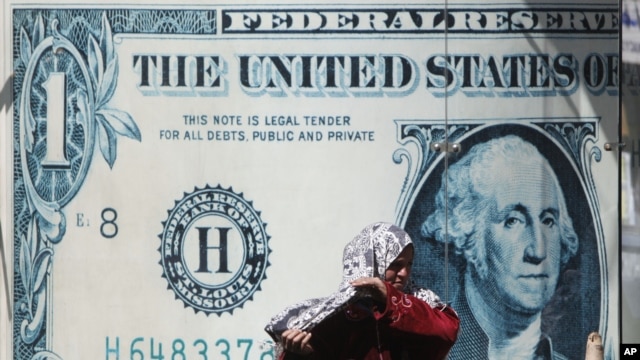 |
| An Egyptian woman adjusts her veil in front of a poster outside an exchange office. (VOA) |
This past week, the United States grew close to finalizing a
deal with Egypt’s new Muslim Brotherhood government and president, Mohamed
Morsi, to help Egypt cut $1 billion from its national debt. Aside from the
irony of one of the most debt-laden countries helping another nation pay off
its own debt, the diplomatic move for the United States promises numerous
benefits.
As the new Egyptian political
system stabilizes, the Muslim Brotherhood ruling party has set its eyes on
dramatically reducing the amount Egypt owes to foreign nations. This past
month, President Morsi set off on a whirlwind tour of the world, not only
re-establishing diplomatic relations with China, Syria, Russia, and the EU, but
also requesting funds to help re-establish democratic relations within Egypt.
Overall, Mr. Morsi’s requests have been successful with China pledging $270
million, the International Monetary Fund (IMF) throwing its support behind a
$4.8 billion loan, and over $375 million invested by American financiers (in
addition to the $1 billion provided by the American government). However,
numerous Congressmen and taxpayers are wondering one thing: where does the
money that President Obama pledged Egypt come from?
Where is the money coming from?
The official
explanation from Patrick Ventrell, the State Department’s acting deputy
spokesman is that the $1 billion is not “new money.” And surprisingly, for
once, the government seems to be correct. Like clockwork, the United States has
given over $1.2 billion per year in military aid for the past few decades.
Throughout the years, the account books have fluctuated back and forth until
Egypt came out in the red—owing the US over $3 billion. Essentially, the money
that the Obama administration is giving/forgiving out of the Egyptian debt is
the money that would have gone to Hosni Mubarak for military support. In other
words, the United States regularly gives Egypt $1 billion per year, so this
deal is nothing new.
Except for the fact that the U.S.
has already given Egypt millions this year. According to the 2012
Appropriations act signed by Obama in December 2011, the U.S. would only give
to Egypt if the government was "supporting the transition to civilian
government, including holding free and fair elections; implementing policies to
protect freedom of expression, association and religion and due process of
law." However, the act allowed the Secretary of State to waive that
requirement, which Hillary Clinton did in March, increasing the amount donated
to over $1.7 million per month given to Egypt.
The reason for the charity.
As
usual, there is a method behind the madness. Maintaining a strong U.S. presence
within Egypt, either militarily or monetarily, is key to preserving Middle-East
accessibility and Egypt-Israel solidarity, notes Patrick Ventrell. As the New
York Times reports, given Egypt’s influence in the Arab world, officials said,
its economic recovery and political stability could have a profound influence
on other nations in transition and ease wariness in Israel about the tumultuous
political changes under way.
It is an economic fundamental that nothing is free—you
always have to give to get. In this case, the U.S. is trading money for
security. One question remains unanswered and unasked however: do we even have
the money to spend?
_________________________________________________________________________________
Sources:
You're back from the dead..... good job... I think you should do a post on who we owe debt to.....
ReplyDelete